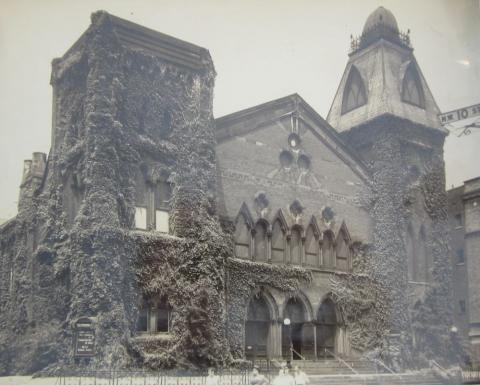10th & G St NW, November 24 & 25, 1884 and February 28, 1885, the final show of the tour.
in May 1868, the congregation moved into its new home at 10th and G St. NW. Its large brick building made a statement. The Congregationalists were here to stay.
The church was abolitionist from the beginning, working for racial justice. However, early in its history there was an internal disagreement about whether its calling was to help freed African Americans start their own churches, or whether it ought to accept African Americans as members of First Church. Those who resisted “integrating” the church, including Dr. Boynton, eventually left to form another church. The early membership rolls show that as many as 381 people had joined by 1870, but 130 of them had left in 1868-69. Those that remained continued to welcome African Americans. The church never had a large number of African American members, however, it worked diligently to use its Sunday School for basic education and to establish other schools to teach freed slaves. In 1867 First Church played a crucial role in the founding of Howard University to promote higher education for African Americans. Later it assisted and gave financial support to African Americans who wanted to organize independent Congregational Churches. Lincoln Temple Congregational UCC and Peoples Congregational UCC were beneficiaries. In fact, over its almost 150 year history First Church has “mothered” or “mentored” five other churches in the Washington, DC area.
In the 1950’s when its vintage building, by then over 90 years old, was declared unsafe, and when other downtown churches were leaving the inner city and moving out into expanding Washington neighborhoods to be near their members, the leaders of the congregation proposed that the congregation sell its increasingly valuable land and use the money to relocate somewhere else. In a “Congregational Church” all major decisions are made by congregational vote. Much to the surprise of the leaders, the congregation soundly rejected their recommendation by a 3 to 1 margin. Most of the church leadership resigned and some members left, but those that remained reaffirmed their commitment to stay in the city. http://www.firstuccdc.org/our-history/
